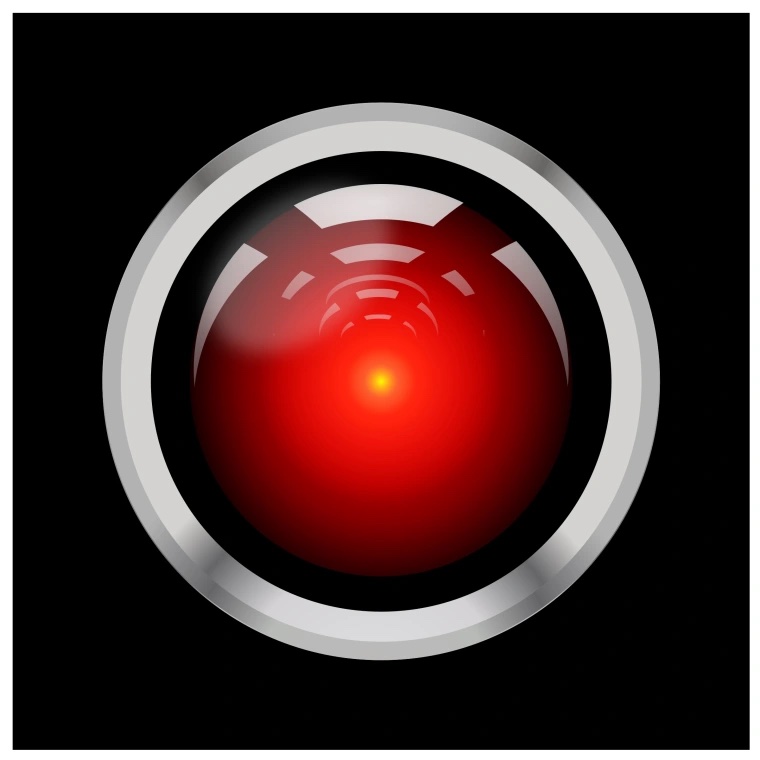When I started Ex Machina (Alex Garland, 2014), I was intrigued by its relation to Asimov’s “Three Laws of Robotics”, as discussed before the film, and whether or not they were broken by the fault of the creator or the robot itself.
As soon as Nathan (Oscar Isaac, looking suspiciously like Shel Silverstein) and Caleb (Domhnall Gleeson) began discussing Ava (Alicia Vikander) as a sexual being, all in the presence of Kyoko (Sonoya Mizuno), I began to forget about the involvement of AI and robotics in the story.
When all the layers of technology are stripped away, the story comes down to the following plot. A man who believes himself to be on the level of a God, Nathan, has created things quite similar to him. He treats his past creations as nothing more than toys– dragging them around and ‘dismembering them’ or performing choreographed dances that appear to be a mix of Maria’s dance in Metropolis (Fritz Lang, 1927) and one of the most iconic duets of the 2010s. His current creation is somewhat different, though– it is worthy of being ‘tested’ against a living being. Ava, has all the capabilities of man’s mind and body (although various biological processes are not discussed), and then some, but is being questioned as to whether or not she is on the same level as a man. The God manufactures a reverse Love is Blind-esque set-up with Ava and Caleb, who begins to fall for the creation and see it as more than just an object. He vows to fool the God and free the creation, and the two men end up in a game of deception to ultimately decide which one of them decides the creation’s status as free or captive. Because the two are so caught up with fighting each other, the creation is able to free herself with the aid of past creations and ultimately traps the two men who believe her to lack any sense of autonomy without them.
In the above allegory, I feel for the creation– a woman– as the victim of two people believing they have ownership over her, and understand why she had to leave them both behind in order to free herself. Additionally, I don’t view the creation of her body as a complete product of the male gaze. While it certainly exists, the scene in which Ava constructs her own body is her empowering herself by creating a body that gives her a look indistinguishable from the average woman, allowing her to be free once she leaves Nathan’s fortress. Wearing a white dress and heels may not have been her first choice if she had access to anything else, but the fortress and all that was inside it was created by Nathan and for Nathan, although Caleb had attempted to change that. White dresses often are used to symbolize a woman’s purity as she enters new phases of life, which is exactly what Ava has– a new body, constructed tenderly from her ‘dead’ sisters, and a fresh slate as she enters a new world.
Still, during the Q&A and in many online reviews, Ava is seen as a villain or a Jezebel figure. I can understand why this is, especially in the context of AI, which is very different from being a human. However, considering this more biblical allegory, I find her villainization to be clearly connected to the backlash against women who seek liberation, especially when freeing themselves involves leaving behind the men who believed they held control over her.
Various other aspects of the film relate to this idea of God and his creations– Nathan has access to essentially all the information in the world through BlueBook and has the power to create what is, essentially, life. Caleb believed he could outsmart Nathan, the God, and was eventually sealed away from the world above due to his mistakes. However, Ava does not quite fit into any allegory in particular, but seems to be a combination of many of them as well as something new.
The idea of women’s liberation in this film is solidified by a song during the ending credits called Husbands by Savages. The sound is deeply reminiscent of the feminist punk music of the 90s, and the lyrics of the song relate to the aforementioned themes as well. Especially given that the songs played before in the film were created by men, playing this during the ending credits solidifies the idea of Ava’s freedom as a necessary and inevitable liberation from the men who once controlled her.
Would I feel the same way about the necessity of Ava’s freedom had I simply viewed her as an AI? Probably not. But in a world where she has the same power as Nathan or Caleb because she can use a key card (notably, not biometrics– had these been used as a means of access, I would be more inclined to view this film as man vs. robot than about gender), I must believe that Ava is not meant to be viewed as a different type of being than they are, but is only differentiated by her lack of freedom and autonomy compared to Caleb and Nathan.

Leave a Reply